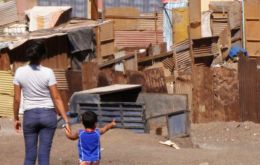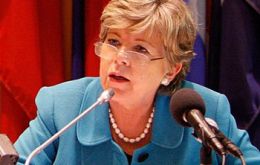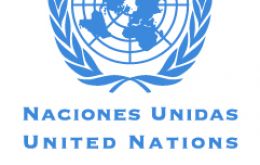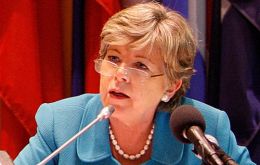MercoPress. South Atlantic News Agency
Tag: CEPAL
-
Thursday, August 1st 2019 - 09:36 UTC
South America expected to grow 0.2% in 2019, forecasts CEPAL

Hit by five years of “economic slowdown,” Latin America's economy will grow by barely 0.5% this year, the United Nations economic commission for the region said on Wednesday, well below the 1.3% projected in April.
-
Tuesday, January 2nd 2018 - 06:20 UTC
Latin American poverty and extreme poverty rose in 2015/16 following a decade of decline

Poverty and extreme poverty levels rose in Latin America as a regional average in 2015 and 2016, after more than a decade of declines in the majority of countries, while in 2017 they are expected to hold steady, the Economic Commission for Latin America and the Caribbean (ECLAC) said.
-
Tuesday, November 29th 2016 - 08:02 UTC
Anti personnel mines conference opens in Santiago; Chile free of minefields by 2020

Ambassadors and representatives of nations that signed the Ottawa Convention called on Monday in Santiago for a quicker clearing of minefields, so that by 2025 the world will be completely free of landmines.
-
Tuesday, May 19th 2015 - 02:05 UTC
Latam unemployment expected to increase as economic activity weakens

The non encouraging economic outlook for the current year will likely prompt a mild increase in the regional unemployment rate to 6.2% from the 6.0% registered in 2014, according to estimates released by the Economic Commission for Latin America and the Caribbean (ECLAC) and the International Labor Organization (ILO).
-
Wednesday, December 3rd 2014 - 07:48 UTC
Latam forecasted to grow 2,2% in 2015, but this year will only average 1.1%

Economic growth in Latin America and the Caribbean will recover in 2015 and reach 2.2% on average, according to new estimates unveiled on Tuesday by the United Nations Economic Commission for Latin America and the Caribbean (ECLAC).
-
Thursday, September 5th 2013 - 02:20 UTC
Latam/China trade highly vulnerable: raw materials for manufactured goods

Over the past decade China has become a key partner for Latin America and the Caribbean with bilateral trade increasing 22 fold between 2000 and 2012, albeit with a strong deficit for Latin American countries, according to Alicia Bárcena, Executive Secretary of the UN Economic Commission for Latin America and the Caribbean.
-
Tuesday, May 21st 2013 - 06:27 UTC
Massive money easing in rich countries making Latam currencies too strong

Currency strength due to stimulus measures in the developed world is currently Latin America's Achilles' heel, though the region's macroeconomic management is a bright spot, the head of the United Nations' body for the region said on Monday.
-
Wednesday, April 24th 2013 - 06:03 UTC
Latam/Caribbean region forecasted to expand 3.5% propped by domestic demand

Latin American and Caribbean countries will grow on average 3.5% this year supported by a strong domestic demand and the improved performance of Argentina and Brazil compared with 2012, according to the latest “Updated economic review of Latin America and the Caribbean 2012’ from the UN Economic Commission for Latinamerica and the Caribbean, ECLAC.
-
Tuesday, November 6th 2012 - 06:28 UTC
Latam labour market ‘fairly resilient’ to the slowdown of the regional economy in 2012

According to the Economic Commission for Latin America and the Caribbean (ECLAC) and the International Labour Organization (ILO), labour markets in Latin America and the Caribbean were fairly resilient to the slowdown in the regional economy in the first half of 2012, which bodes well for a positive outcome in this year's employment and unemployment indicators.
-
Wednesday, May 4th 2011 - 21:17 UTC
Latam FDI soars 40% in 2010, mainly natural resources and services

Latin America and the Caribbean was the region with the strongest percentage increases as a recipient and source of Foreign Direct Investment (FDI), according to a report presented Wednesday in Mexico City by the Economic Commission for Latin America and the Caribbean, ECLAC.
